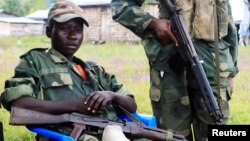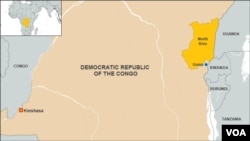GOMA, DEMOCRATIC REPUBLIC OF THE CONGO —
Fighting has continued for a second day between the Democratic Republic of Congo’s army and the M23 rebels near the city of Goma, which is due to be visited by the United Nations Secretary General Ban Ki-moon this week. The DRC government says at least 19 people have been killed in the clashes.
Heavy weapons fire started again Tuesday morning a few kilometers north of Goma. By mid-afternoon the firing was sporadic and soldiers at the army’s battle headquarters appeared to be fairly relaxed, as did civilians in the village nearby.
Maumbi Ndole, a civilian living near the front line, says he has been hearing small arms and heavy weapons fire most of the day, and he is waiting to see what happens.
A DRC army spokesman, Colonel Olivier Hamuli, says the M23 forces attacked army positions again, in a bid to recover ground they lost to government forces on Monday.
Another army source said the rebels had taken that position from the army on Monday but lost it after several hours of fighting.
The M23 has accused the army of fighting alongside the FDLR, or Democratic Forces for the Liberation of Rwanda, a rebel group made up partly of fighters who were involved in the 1994 Rwandan genocide. The DRC government denies the charge.
Civilian Ndole said he is satisfied with the army’s conduct so far in this battle. He says the government troops are calm and behaving well as they have not been taking anything from civilians and they have been advancing. He says local people are happy about that.
The rebels’ spokesman was unavailable for comment. But in a statement last night, the M23 rebels denounced what they called the "military option" taken by the government and reaffirmed the movement's commitment to peace talks in the Ugandan capital Kampala. Those talks are currently stalled.
Ki-moon is due to visit Congo on Wednesday, and come to Goma on Thursday. Speaking in Mozambique ahead of the visit, he said the current flare-up in the DRC means the deployment of a U.N. military taskforce with a tough mandate to attack rebel forces should be speeded up.
Heavy weapons fire started again Tuesday morning a few kilometers north of Goma. By mid-afternoon the firing was sporadic and soldiers at the army’s battle headquarters appeared to be fairly relaxed, as did civilians in the village nearby.
Maumbi Ndole, a civilian living near the front line, says he has been hearing small arms and heavy weapons fire most of the day, and he is waiting to see what happens.
A DRC army spokesman, Colonel Olivier Hamuli, says the M23 forces attacked army positions again, in a bid to recover ground they lost to government forces on Monday.
Another army source said the rebels had taken that position from the army on Monday but lost it after several hours of fighting.
The M23 has accused the army of fighting alongside the FDLR, or Democratic Forces for the Liberation of Rwanda, a rebel group made up partly of fighters who were involved in the 1994 Rwandan genocide. The DRC government denies the charge.
Civilian Ndole said he is satisfied with the army’s conduct so far in this battle. He says the government troops are calm and behaving well as they have not been taking anything from civilians and they have been advancing. He says local people are happy about that.
The rebels’ spokesman was unavailable for comment. But in a statement last night, the M23 rebels denounced what they called the "military option" taken by the government and reaffirmed the movement's commitment to peace talks in the Ugandan capital Kampala. Those talks are currently stalled.
Ki-moon is due to visit Congo on Wednesday, and come to Goma on Thursday. Speaking in Mozambique ahead of the visit, he said the current flare-up in the DRC means the deployment of a U.N. military taskforce with a tough mandate to attack rebel forces should be speeded up.





